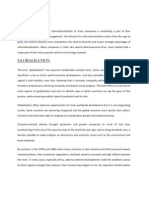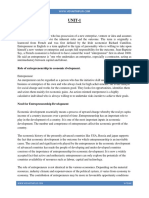Define Globalization Lecture Notes 1
Define Globalization Lecture Notes 1
Uploaded by
Johairah YusophCopyright:
Available Formats
Define Globalization Lecture Notes 1
Define Globalization Lecture Notes 1
Uploaded by
Johairah YusophOriginal Title
Copyright
Available Formats
Share this document
Did you find this document useful?
Is this content inappropriate?
Copyright:
Available Formats
Define Globalization Lecture Notes 1
Define Globalization Lecture Notes 1
Uploaded by
Johairah YusophCopyright:
Available Formats
lOMoARcPSD|5274018
Define Globalization - Lecture notes 1
Purposive Communication (Polytechnic University of the Philippines)
StuDocu is not sponsored or endorsed by any college or university
Downloaded by Sittie Johairah Yusoph (sjyusoph@gmail.com)
lOMoARcPSD|5274018
Define Globalization:
Globalization is a process of interaction and integration among the people,
companies, and governments of different nations, a process driven by international
trade and investment and aided by information technology. This process has effects
on the environment, on culture, on political systems, on economic development and
prosperity, and on human physical well-being in societies around the world.
Technology has been the other principal driver of globalization. Advances in
information technology, in particular, have dramatically transformed economic life.
Information technologies have given all sorts of individual economic actors—
consumers, investors, businesses—valuable new tools for identifying and pursuing
economic opportunities, including faster and more informed analyses of economic
trends around the world, easy transfers of assets, and collaboration with far-flung
partners.
Globalization is deeply controversial, however. Proponents of globalization
argue that it allows poor countries and their citizens to develop economically and raise
their standards of living, while opponents of globalization claim that the creation of an
unfettered international free market has benefited multinational corporations in the
Western world at the expense of local enterprises, local cultures, and common people.
Resistance to globalization has therefore taken shape both at a popular and at a
governmental level as people and governments try to manage the flow of capital, labor,
goods, and ideas that constitute the current wave of globalization.
To find the right balance between benefits and costs associated with
globalization, citizens of all nations need to understand how globalization works and
the policy choices facing them and their societies.
Downloaded by Sittie Johairah Yusoph (sjyusoph@gmail.com)
lOMoARcPSD|5274018
Entrepreneurship Among Professionals and Its Importance to
Local and Global Company
Entrepreneurs are often thought of as national assets to be refined, motivated
and remunerated to the greatest possible extent. Entrepreneurs can change the way
we live and work. If successful, their revolutions may improve our standard of living.
In short, in addition to creating wealth from their entrepreneurial ventures, they also
create jobs and the conditions for a flourishing society. Entrepreneurship capital is
defined as "a region's endowment with factors conducive to the creation of new
businesses" and it exerts a positive impact on the region's economic output.
Regions with a higher level of entrepreneurship capital show higher levels of output
and productivity, while those lacking entrepreneurship capitals have a tendency to
generate lower levels of output and productivity.
The impact of entrepreneurship capital is stronger than that of knowledge capital.
Evidence indicates that entrepreneurial capital plays a very important role in the
production function model presented.
The following are six reasons why entrepreneurship capital is important to the
economy:
1. Entrepreneurs Create New Businesses
Path-breaking offerings by entrepreneurs, in the form of new goods and services,
result in new employment, which can produce a cascading effect or virtuous circle in
the economy. The stimulation of related businesses or sectors that support the new
venture add to further economic development.
For example, a few IT companies founded the Indian IT industry in the 1990s as a
backend programmers' hub. Soon the industry gathered pace in its own programmers’
domain. But more importantly, millions from other sectors benefitted from it.
Businesses in associated industries, like call centre operations, network maintenance
companies and hardware providers, flourished. Education and training institutes
nurtured a new class of IT workers offering better, high-paying jobs. Infrastructure
development organizations and even real estate companies capitalized on this growth
as workers migrated to employment hubs seeking new improved lives.
Similarly, future development efforts in underdeveloped countries will require robust
logistics support, capital investment from buildings to paper clips and a qualified
workforce. From the highly qualified programmer to the construction worker, the
entrepreneur enables benefits across a broad spectrum of the economy.
Downloaded by Sittie Johairah Yusoph (sjyusoph@gmail.com)
lOMoARcPSD|5274018
2. Entrepreneurs Add to National Income
Entrepreneurial ventures literally generate new wealth. Existing businesses may
remain confined to the scope of existing markets and may hit the glass ceiling in terms
of income. New and improved offerings, products or technologies from entrepreneurs
enable new markets to be developed and new wealth created.
Additionally, the cascading effect of increased employment and higher earnings
contribute to better national income in form of higher tax revenue and higher
government spending. This revenue can be used by the government to invest in other,
struggling sectors and human capital.
Although it may make a few existing players redundant, the government can soften
the blow by redirecting surplus wealth to retrain workers.
3. Entrepreneurs Also Create Social Change
Through their unique offerings of new goods and services, entrepreneurs break away
from tradition and indirectly support freedom by reducing dependence on obsolete
systems and technologies. Overall, this results in an improved quality of life, greater
morale and economic freedom.
For example, the water supply in a water-scarce region will, at times, force people to
stop working to collect water. This will impact their business, productivity and income.
Imagine an innovative, automatic, low-cost, flow-based pump that can fill in people's
home water containers automatically.
Such an installation will ensure people are able to focus on their core jobs without
worrying about a basic necessity like carrying water. More time to devote to work
means economic growth.
For a more contemporary example, smartphones and their smart apps have
revolutionized work and play across the globe. Smartphones are not exclusive to rich
countries or rich people either. As the growth of China's smartphone market and its
smartphone industry show, technological entrepreneurship will have profound, long
lasting impacts on the entire human race.
Moreover, the globalization of tech means entrepreneurs in lesser-developed
countries have access to the same tools as their counterparts in richer countries. They
also have the advantage of a lower cost of living, so a young individual entrepreneur
from an underdeveloped country can take on the might of the multi-million-dollar
existing product from a developed country.
4. Community Development
Downloaded by Sittie Johairah Yusoph (sjyusoph@gmail.com)
lOMoARcPSD|5274018
Entrepreneurs regularly nurture entrepreneurial ventures by other like-minded
individuals. They also invest in community projects and provide financial support to
local charities. This enables further development beyond their own ventures.
Some famous entrepreneurs, like Bill Gates, have used their money to finance good
causes, from education to public health. The qualities that make one an entrepreneur
are the same qualities that motivate entrepreneurs to take it forward.
5. The Other Side of Entrepreneurs
Are there any drawbacks to cultivating entrepreneurs and entrepreneurship? Is there
an “upper limit” for the number of entrepreneurs a society can hold?
Italy may provide an example of a place where high levels of self-employment have
proved to be inefficient for economic development. Research reveals that Italy has in
the past experienced large negative impacts on the growth of its economy because of
self-employment. There may be truth in the old saying, "too many chefs and not
enough cooks spoil the soup."
6. The Role of States
Regulations play a crucial role in nurturing entrepreneurship, but regulation requires a
fine balancing act on the part of the regulating authority. Unregulated entrepreneurship
may lead to unwanted social outcomes including unfair market practices, pervasive
corruption, financial crisis and even criminal activity.
Paradoxically, a significantly high number of entrepreneurs may lead to fierce
competition and loss of career choices for individuals. With too many entrepreneurs,
levels of aspirations usually rise. Owning to the variability of success in entrepreneurial
ventures, the scenario of having too many entrepreneurs may also lead to income
inequalities, making citizens more – not less – unhappy.
The interesting interaction of entrepreneurship and economic development has vital
inputs and inferences for policy makers, development institutes, business owners,
change agents and charitable donors. If we understand the benefits and drawbacks,
a balanced approach to nurturing entrepreneurship will definitely result in a positive
impact on economy and society.
Downloaded by Sittie Johairah Yusoph (sjyusoph@gmail.com)
lOMoARcPSD|5274018
Question: How do you apply your courses in this aspect?
As a Medical Laboratory Scientist Student (MedTech), I could say that
globalization has been an integral section of the society where everyone easily
expresses their thoughts or notions no matter what language they used in global terms.
The world is getting more connected than ever. It is growing interdependence of the
world’s economies, cultures, and populations, brought about by cross-border trade in
goods and services, technology, and flows of investment, people, and information.
Hence, in applying this aspect to my chosen career, it brought me to the advances
and faster trade of information that lets me to do greater more! I got to invest
automatically for the betterment and more inclusive education to prepare for
tomorrow’s economy. It allows my ability to move and communicate easily with others
all over the world in order to conduct or implement business from local to international.
Arises of medical devices is greatly impacted by the product regulatory approval
system, health technology assessment, and reimbursement system. Considering the
current trend of evidence-based medicine and value-based pricing, efforts to generate
clinical evidence strengthened even further which literally a great help.
Public health policy and practice have been increasingly challenged by
globalization, even as global financing for health has increased dramatically. This
discusses globalization and its health challenges from a vantage of political science,
emphasizing increased global flows (of pathogens, information, trade, finance, and
people) as driving, and driven by, global market integration. This integration requires
a shift in public health thinking from a singular focus on international health (the higher
disease burden in poor countries) to a more nuanced analysis of global health (in
which health risks in both poor and rich countries are seen as having inherently global
causes and consequences).
Nevertheless, since technology moves as a tool to make it possible to
integrated the dots into a successful pattern, globalization makes sense. Assure also
that the healthcare system does not impede workers (like me) from finding new jobs
or cause significant financial hardship.
Diana Jane Ceniza
Future RMT, M.D
Downloaded by Sittie Johairah Yusoph (sjyusoph@gmail.com)
You might also like
- Portable Appliance Testing (Pat) Report/Certificate: Copy Certificate Certificate Reference NumberDocument3 pagesPortable Appliance Testing (Pat) Report/Certificate: Copy Certificate Certificate Reference NumberPete KomorNo ratings yet
- Certificate Aboveground PipingDocument5 pagesCertificate Aboveground Pipingsajeed76740No ratings yet
- Role of Business in Economic DevelopmentDocument4 pagesRole of Business in Economic DevelopmentMohammad Shahjahan SiddiquiNo ratings yet
- Activity 4Document4 pagesActivity 4raymart copiarNo ratings yet
- KSE340TPN Enclosed Switch DisconnectorDocument3 pagesKSE340TPN Enclosed Switch DisconnectorFun TonNo ratings yet
- Opengl ProjectDocument52 pagesOpengl Projectpavan146_s808981% (21)
- HP 6120xg ConfigDocument4 pagesHP 6120xg ConfigdineshNo ratings yet
- JMS 316 GS-B.L: Technical SpecificationDocument4 pagesJMS 316 GS-B.L: Technical SpecificationMartin KratkyNo ratings yet
- It Health Check Report TemplateDocument3 pagesIt Health Check Report TemplateELias ELNo ratings yet
- Why Entrepreneurs Are Important For Boosting The Indian EconomyDocument4 pagesWhy Entrepreneurs Are Important For Boosting The Indian EconomyMurali RamachandranNo ratings yet
- Why Entrepreneurship Is Important To The EconomyDocument3 pagesWhy Entrepreneurship Is Important To The EconomyAnna Rose T. MarcelinoNo ratings yet
- Entrepreneurship: Role of Entrepreneurship To The Economic Development Why Entrepreneurship Is Important To The EconomyDocument9 pagesEntrepreneurship: Role of Entrepreneurship To The Economic Development Why Entrepreneurship Is Important To The EconomyShaina Mariz Serrano PanaliganNo ratings yet
- Chapter 3 EntrepreneurshipDocument3 pagesChapter 3 EntrepreneurshipMikaela FraniNo ratings yet
- 6 Reasons Why Entrepreneurship Is Important 341Document5 pages6 Reasons Why Entrepreneurship Is Important 341Muhammad BabarNo ratings yet
- Role of Business in EconomyDocument13 pagesRole of Business in EconomyCharles Benedict FaalaNo ratings yet
- Paper Presentation Tur, M.div - IIDocument6 pagesPaper Presentation Tur, M.div - IIGospel VanlalrinchhanaNo ratings yet
- Entrepreneurship ModuleDocument7 pagesEntrepreneurship ModuleMis El100% (1)
- 0000176Document2 pages0000176Aeron Rai RoqueNo ratings yet
- Role of Entrepreneurship To The Economic Development: Reporter 1Document3 pagesRole of Entrepreneurship To The Economic Development: Reporter 1Shaina Mariz Serrano PanaliganNo ratings yet
- What Is The Value of Research and Development Thales Learning & DevelopmentDocument1 pageWhat Is The Value of Research and Development Thales Learning & Developmentmallanooka.rajuNo ratings yet
- III. Role of and Importance of Entrepreneurship in Economic GrowthDocument4 pagesIII. Role of and Importance of Entrepreneurship in Economic GrowthMiguel angelo MendozaNo ratings yet
- Role of Entrepreneurship in Economic Development-1Document3 pagesRole of Entrepreneurship in Economic Development-1ajvs60577No ratings yet
- Conl Shoaib AssignmentDocument63 pagesConl Shoaib AssignmentMuneeb AbbasiNo ratings yet
- 4.2.6.4 - Seminar International Development Ii (Social Enterpreuneurship)Document9 pages4.2.6.4 - Seminar International Development Ii (Social Enterpreuneurship)julius gitonga100% (1)
- 0000177Document4 pages0000177Aeron Rai RoqueNo ratings yet
- Megatrends Report 2015Document56 pagesMegatrends Report 2015Cleverson TabajaraNo ratings yet
- Entrepreneurship Challenges and OpportunitiesDocument10 pagesEntrepreneurship Challenges and Opportunitiescool_karthiNo ratings yet
- Module 14Document6 pagesModule 14hermancxNo ratings yet
- 7 Ways Entrepreneurs Drive Economic Development: 1. Investing in Products and Services People NeedDocument3 pages7 Ways Entrepreneurs Drive Economic Development: 1. Investing in Products and Services People NeedtehaNo ratings yet
- The Changing Rules of GlobalDocument8 pagesThe Changing Rules of GlobalShin Soo RinNo ratings yet
- MOVENUDocument11 pagesMOVENUjmn5rrzn4hNo ratings yet
- Articles GlobalizationDocument20 pagesArticles Globalizationmeeru360No ratings yet
- 2-2 Innovation Management (IM) - Calilap-2Document3 pages2-2 Innovation Management (IM) - Calilap-2Reciel MaingatNo ratings yet
- Entrepreneurial Ecosystem in LebanonDocument10 pagesEntrepreneurial Ecosystem in LebanonTarek TomehNo ratings yet
- Industrial Development Report 2002-2003Document203 pagesIndustrial Development Report 2002-2003umer shafiqueNo ratings yet
- Entrep. Mind Chapter 7Document29 pagesEntrep. Mind Chapter 7Mark joseph MartinezNo ratings yet
- Lesson 3 Organization & ManagementDocument6 pagesLesson 3 Organization & ManagementLWNo ratings yet
- Learning Outcome: Entrepreneurial EnvironmentDocument8 pagesLearning Outcome: Entrepreneurial EnvironmentT. Vijayashankar CIVILNo ratings yet
- EntrepreneurshipDocument20 pagesEntrepreneurshipbbrraaddNo ratings yet
- Globalization Term PaperDocument31 pagesGlobalization Term PaperSP_singh90% (20)
- Entrepreneurship Can Be Described As A Process of Action AnDocument5 pagesEntrepreneurship Can Be Described As A Process of Action AnMirna KassarNo ratings yet
- Emerging EntrepreneurshipDocument7 pagesEmerging Entrepreneurshipinderpreet sumanNo ratings yet
- UNIT-1 Entrepreneur: Role of Entrepreneurship in Economic DvelopmentDocument10 pagesUNIT-1 Entrepreneur: Role of Entrepreneurship in Economic DvelopmentKrishnan VelavanNo ratings yet
- Entrepreneurship Is The Act of Being An Entrepreneur, Which Is A French Word Meaning "One WhoDocument3 pagesEntrepreneurship Is The Act of Being An Entrepreneur, Which Is A French Word Meaning "One WhonanimdpNo ratings yet
- Las in Org MGT Week5Document11 pagesLas in Org MGT Week5sarah fojasNo ratings yet
- Trends of I.B.Document13 pagesTrends of I.B.Nidhi BansalNo ratings yet
- Impact of Globalization On SMEsDocument25 pagesImpact of Globalization On SMEsjoseph.kekslNo ratings yet
- Training ManualDocument248 pagesTraining ManualIVAN JIRONGONo ratings yet
- Creating The Environment For Entrepreneurial SuccessDocument70 pagesCreating The Environment For Entrepreneurial SuccessSok HengNo ratings yet
- Arma-EntrepDocument6 pagesArma-EntrepanthonyocenararmaNo ratings yet
- Assignment-01: Question.1 - Imporatnce of Management Is Important Aspect of Management - Discuss. AnswerDocument11 pagesAssignment-01: Question.1 - Imporatnce of Management Is Important Aspect of Management - Discuss. AnswerAdarsh singhNo ratings yet
- Pranav Gupta Economics 3Document6 pagesPranav Gupta Economics 3guptapranav404No ratings yet
- Technological Environment Impacting Entrepreneurship: Submitted To:prof. Brajballav KarDocument6 pagesTechnological Environment Impacting Entrepreneurship: Submitted To:prof. Brajballav KarVedika AgrawalNo ratings yet
- Midterm Examination IbtDocument7 pagesMidterm Examination IbtChristen HerceNo ratings yet
- Lesson 5Document16 pagesLesson 5msalino.tcNo ratings yet
- Aguilara LiteraturereviewfinalDocument10 pagesAguilara Literaturereviewfinalapi-273474260No ratings yet
- Ajol File Journals - 336 - Articles - 40998 - Submission - Proof - 40998 4009 19484 1 10 20080225Document30 pagesAjol File Journals - 336 - Articles - 40998 - Submission - Proof - 40998 4009 19484 1 10 20080225amare genetuNo ratings yet
- 54 18349policy - Brief - 27 - 04 - Final PDFDocument5 pages54 18349policy - Brief - 27 - 04 - Final PDFjosua_007No ratings yet
- Ed Notes (Revised)Document77 pagesEd Notes (Revised)janakiraman sureshkumarNo ratings yet
- New Microsoft Word DocumentDocument22 pagesNew Microsoft Word DocumentAjay PandayNo ratings yet
- Define Entrepreneurship and Explain How An Entrepreneurial Mindset Is Important For The Development of The Country and Society in GeneralDocument3 pagesDefine Entrepreneurship and Explain How An Entrepreneurial Mindset Is Important For The Development of The Country and Society in GeneralHarsh ShahNo ratings yet
- The Entrepreneurial Imperative: How America's Economic Miracle Will Reshape the World (and Change Your Life)From EverandThe Entrepreneurial Imperative: How America's Economic Miracle Will Reshape the World (and Change Your Life)No ratings yet
- Its All in the Price: A Business Solution to the EconomyFrom EverandIts All in the Price: A Business Solution to the EconomyNo ratings yet
- Functions and Philosophical Perspectives On ArtDocument6 pagesFunctions and Philosophical Perspectives On ArtJohairah YusophNo ratings yet
- LettersDocument6 pagesLettersJohairah YusophNo ratings yet
- MRW A Maranao Dictionary-Front 1996 PDFDocument31 pagesMRW A Maranao Dictionary-Front 1996 PDFJohairah YusophNo ratings yet
- Spiritual Reflection: My Daily Ramadhan Ibadah ListDocument2 pagesSpiritual Reflection: My Daily Ramadhan Ibadah ListJohairah YusophNo ratings yet
- Assigned LegRes PDFDocument5 pagesAssigned LegRes PDFJohairah YusophNo ratings yet
- GEED 10063 Purposive Communication GEED 10063 Purposive CommunicationDocument8 pagesGEED 10063 Purposive Communication GEED 10063 Purposive CommunicationJohairah Yusoph100% (1)
- Theories Attachment Theories AttachmentDocument11 pagesTheories Attachment Theories AttachmentJohairah YusophNo ratings yet
- Unit 6 C ProgDocument11 pagesUnit 6 C ProgRIT BCANo ratings yet
- 25th World Road Congress Seoul - Circular2 - Eng PDFDocument40 pages25th World Road Congress Seoul - Circular2 - Eng PDFuntung CahyadiNo ratings yet
- UC Berkeley Extension: Strategic Marketing - Professor Jim ProstDocument29 pagesUC Berkeley Extension: Strategic Marketing - Professor Jim ProstMuhammad BaihaqiNo ratings yet
- WincuplDocument96 pagesWincuplAdrian Sanchez CarriloNo ratings yet
- Present Azi OneDocument292 pagesPresent Azi Onesistr piospNo ratings yet
- TPE331-14 Turboprop EngineDocument2 pagesTPE331-14 Turboprop EnginemishanbgdNo ratings yet
- PT SUPREME CABLE Company Profile 2022Document16 pagesPT SUPREME CABLE Company Profile 2022Mhuez Anhek GheloNo ratings yet
- (2001) Berlingo c15 Jumper JumpyDocument344 pages(2001) Berlingo c15 Jumper JumpyservicerNo ratings yet
- Electrical Testing On Turbogenerator (TG2Document40 pagesElectrical Testing On Turbogenerator (TG2rkc100% (1)
- Iqwq Sa Vqmat D6 0088 - 0 PDFDocument145 pagesIqwq Sa Vqmat D6 0088 - 0 PDFahmed abadaliNo ratings yet
- Aerco BMK Manual IomDocument184 pagesAerco BMK Manual IomAnabel HernándezNo ratings yet
- Bonza (Game) : GameplayDocument3 pagesBonza (Game) : GameplayMarwin AceNo ratings yet
- Automatic Generation of Java Code From UML Diagrams Using UjectorDocument18 pagesAutomatic Generation of Java Code From UML Diagrams Using Ujectorisoft2003No ratings yet
- Sistem Steering: By: Mazheidy Bin Mat DarusDocument20 pagesSistem Steering: By: Mazheidy Bin Mat DarusMazheidy Mat DarusNo ratings yet
- 3 Non-Residential V4Document49 pages3 Non-Residential V4Ah LoutNo ratings yet
- (Advances in Industrial Control) Victor M. Alfaro, Ramon Vilanova (Auth.) - Model-Reference Robust Tuning of PID Controllers-Springer International Publishing (2016)Document202 pages(Advances in Industrial Control) Victor M. Alfaro, Ramon Vilanova (Auth.) - Model-Reference Robust Tuning of PID Controllers-Springer International Publishing (2016)raul rasconNo ratings yet
- Geographic Information System GIS: Faculty of Applied Engineering and Urban Planning Civil Engineering DepartmentDocument12 pagesGeographic Information System GIS: Faculty of Applied Engineering and Urban Planning Civil Engineering DepartmentDoha anaNo ratings yet
- I HSPA HandbookDocument27 pagesI HSPA HandbookVijay VermaNo ratings yet
- Psi SiDocument3 pagesPsi Siapi-19973617No ratings yet
- Mini Excavator Price List From BonovoDocument2 pagesMini Excavator Price List From BonovoSeif LassouedNo ratings yet
- Billing Management Console-AWS-HE-July-2023Document3 pagesBilling Management Console-AWS-HE-July-2023heinlinnNo ratings yet
- DATASheet 50 - 53HDocument66 pagesDATASheet 50 - 53HXraux DroixNo ratings yet
- Call For Book Chapters in Routledge On Digital TransformationDocument1 pageCall For Book Chapters in Routledge On Digital TransformationPushan DuttaNo ratings yet
































































































